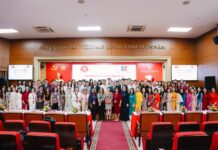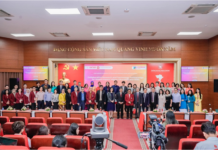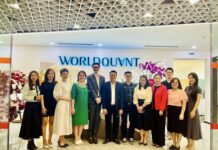Professor Klaus Schawab, chairman of the Davos World Economic Forum, who launched the concept of the 4th Industrial Revolution, asserted “We are moving towards a technological revolution, life style, work style and communication. In terms of scope, level and complexity, this shift is not the same as anything that humans have experienced”.
Recognizing this trend, on June 13, 2017, in the conference room Lien Viet, Foreign Trade University held a seminar entitled “The Fourth Industrial Revolution: Opportunities and Challenges for Enterprises in Vietnam”. The seminar was the place where researchers and faculty share their research and knowledge related to the science and technology revolution and its impact on the business, thus opening up opportunities for collaboration and new research directions in the future.
Attending the seminar, guest was Dr. Michael Palmer from RMIT University (Australia). As for Foreign Trade University, the Principal, Assoc. Prof. Dr. Bui Anh Tuan; Deputy Secretary of the Party Committee, Vice president, Associate Professor, Dr. Dao Thi Thu Giang; Vice president, Assoc. Prof. Dr. Le Thi Thu Thuy. In addition, the workshop also involved lecturers and students who were in interested in the topic. The presence of Dean of Faculty of International Economics, Assoc. Prof. Dr. Nguyen Thi Tuong Anh.
In the opening speech, Assoc. Prof. Bui Anh Tuan pointed out the importance of successfully grasping and applying the achievements of the 4th Industrial Revolution into the economy in general and the background and Vietnam economy in particular. Associate Prof. Dr. Bui Anh Tuan emphasized that the Government also recognized the importance of this revolution and soon had appropriate policy adjustments, including the orientation to develop universities to train high quality human resources to master new technology. Assoc. Prof. Dr. Bui Anh Tuan hoped this workshop would open up a series of other research activities related to the topic of the 4th revolution.
The seminar was delivered by Nguyen Thi Minh Thu, “Is Industry 4.0 reshaping the economy?”. The presentation brought an overview of the 4.0 technology revolution with its positive and negative impacts on the economy. Basically, in the longer term when the economy had enough time to adapt, this technological revolution would create a huge positive impact on economic growth. Followed by Dr. Michael Palmer’s presentation “Testing disability determination procedures for social protection programs in Vietnam”. This was a relatively new field of study (health policy) as compared to the traditional field of research conducted by FTU. While not directly referring to the 4.0 revolution, the researchers continue to see the potential of the 4.0 revolution in solving social problems. In order to master the technological success of this revolution, the human factor played an extremely important role. The following presentation by Nguyen Tung Lam, “Improve the Vietnamese Workforce of Professional Qualities in the Context of The Fourth Industrial Revolution”, outlined the qualities and skills required for Vietnamese laborers to make effective use of the opportunities offered by the 4.0 revolution. Finally, under the microscope, Nguyen Thuy Quynh’s presentation “Internet of Things: Opportunities for Logistic Sector in Vietnam” analyzed specific technologies that the Vietnamese logistic industry can exploit to improve Competitive power in the integration period. The research also suggested a number of modern technologies that can be applied in many areas of production and distribution of goods in order to increase the efficiency of the use of resources of the whole economy.
Presentations at the workshop contributed to enhancing the understanding among the team of scientists and students about the theme of industrial revolution and its impact on businesses in Vietnam. At the same time, the workshop also provided suggestions and solutions to help businesses in Vietnam and workers make the most of the opportunities that the 4th Industrial Revolution brings. The workshop was also a prerequisite for scientists who had the same idea to meet in exchange for the formation of future research groups.
Presentations and exchanges at the workshop contributed to enhancing the understanding among the team of scientists and students about the green economy towards sustainable growth. At the same time, the workshop also provided important policy recommendations to achieve this goal. The workshop was also a prerequisite for scientists who have the same topic to meet in exchange for the formation of future research groups.











